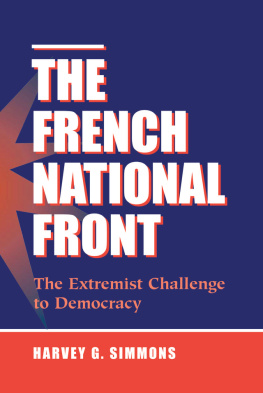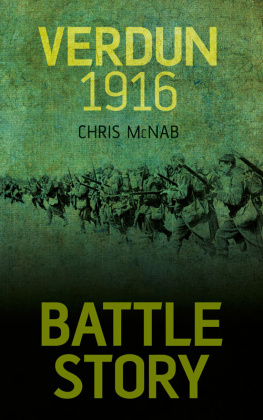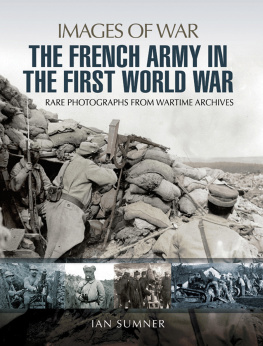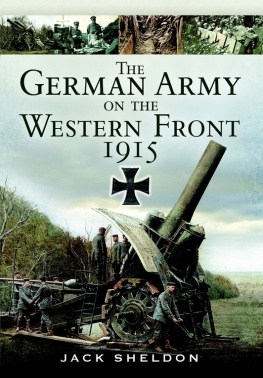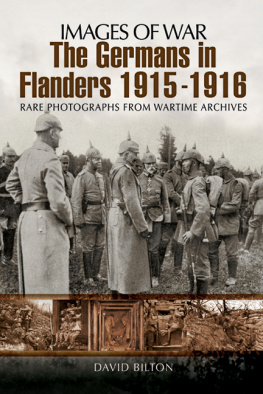
This edition is published by PICKLE PARTNERS PUBLISHING www.picklepartnerspublishing.com
To join our mailing list for new titles or for issues with our books
Or on Facebook
Text originally published in 1924 under the same title.
Pickle Partners Publishing 2013, all rights reserved. No part of this publication may be reproduced, stored in a retrieval system or transmitted by any means, electrical, mechanical or otherwise without the written permission of the copyright holder.
Publishers Note
Although in most cases we have retained the Authors original spelling and grammar to authentically reproduce the work of the Author and the original intent of such material, some additional notes and clarifications have been added for the modern readers benefit.
We have also made every effort to include all maps and illustrations of the original edition the limitations of formatting do not allow of including larger maps, we will upload as many of these maps as possible.
FRENCH
HEADQUARTERS
1915-1918
By
JEAN DE PIERREFEU
Tra n slated with Notes by
MAJOR C. J. C. STREET, O.B.E., M.C.
TABLE OF CONTENTS
Contents
TABLE OF CONTENTS2
INTRODUCTION
IN this book, which has gone into many editions in its native country, M. Jean de Pierrefeu recounts his experiences at French Military Headquarters from November, 1915, until the end of the Great War.
As his own narrative shows, he was appointed to G.Q.G. (Grand Quartier Gnral) for the purposes of drawing up the daily communiqu, a duty which brought him into personal contact with most of the more famous French commanders and staff officers. His keen sense of observation and his telling powers of description have enabled him to convey a series of impressions of these men and of the conditions under which they worked which may well rank with the work of the greater historians.
But the book is by no means merely a record of events or a catalogue of personalities. From it the English-speaking reader may derive an insight into many things which puzzled him at the time of their occurrence, and which have never been satisfactorily explained from the French civilian point of view. Much has been said and written, for example, of Nivelles tragic spring offensive of 1917, and of the epidemic of mutiny in the French Army which followed it. In this narrative the author, a soldier for the moment, but essentially a civilian at heart, preserving the statesmans rather than the soldiers outlook, concerns himself not so much with the events themselves, as with the conditions which led up to them. He shows us Nivelle, swept to the leadership of the French armies, over the heads of men like Castelnau and Ptain, on a wave of popular enthusiasm bred of his success at Verdun, and desperately anxious to accomplish something on a scale to justify his sudden elevation. We see his failure, inevitable from the first, rendered even more certain by his own impetuosity; we see the consequences of that failure, which, in the authors own words, very nearly discouraged the French Army forever, and which it took Ptain a year to repair.
M. Pierrefeus hero of the war is Ptain, the man who was called upon to take over the command from Nivelle, and who, with infinite perseverance, steadied the failing morale of the troops until once more they became fit to bear the strain of retreat and even more rapid advance during the last phase of the war. To the English-speaking reader it may seem that the author fails somewhat in full appreciation of the part played by Frances alliesit should never be forgotten, for example, that from August 8th to November 11th, 1918, the British Army took 188,700 prisoners, while during the same period the combined French, Belgian and American captures totalled 196,800. But it must be borne in mind that the author is before everything else a patriotic Frenchman, burning with pride of his country, and writing primarily of the French effort. He sees in Ptain the embodiment of the true French spirit, persevering in the face of the disapproval and even open opposition of lesser men, soldiers as well as politicians. To him, Ptain is the man who won the war, and in his whole-hearted admiration of the man and his methods we have at least an interesting appreciation of a soldier by a civilian peculiarly qualified to judge of his merits.
Of the historical merits of the book there can be no doubts, but its principal appeal is to the general reader who is interested in the human motives which govern events.
FOREWORD
THIS work is a faithful account of the observations I was enabled to make at General Headquarters during the course of the three years that I spent there as the official Eyewitness. Although I have committed no indiscretion in depicting the surroundings of the High Command, and have divulged none of its secrets, I should doubtless have refrained from initiating the public into the inner life of the commanders and their Staff, had not certain of the more famous generals themselves taken their readers behind the scenes of the war for their own personal reasons. No one can blame me for imitating them in a purely literary manner.
In writing these pages, I need hardly say that I have not been swayed by any feeling of rancour or of disappointed ambition. I found always at G.Q.G., at the hands of my superiors and colleagues, the warmest welcome and the most complete understanding, and I think that they will be able to discover beneath my little sallies and the pointed and sometimes amusing anecdotes which I relate, the profound sympathy, and often admiration, which inspired me while writing these notes. I have endeavoured to collect, in the manner of Taine, a group of true incidents, and from them to draw, quite impartially, a general conclusion for which I alone am responsible. If I have not been able to resist the temptation of giving certain scenes the picturesque touch and air of interest which they possessed as they unrolled themselves before my eyes (even at the risk of impairing the style of a work which, on the whole, is of an historic nature), and of falling occasionally into the manner of a satirical or even fantastic essay, I beg forgiveness. There is in every critic, and perhaps in every historian, something of the repressed novelist, who tries to take his revenge, rather like an old cart-horse which remembers that it used to be a thoroughbred, and begins to curvet and arch its neck.
My principal fear is lest I should be judged by incomplete quotations taken from the book for a more or less frankly avowed purpose. Like all books written from personal observation, this book aims at Truth, and Truth alone; and therefore appreciation is to be found side by side with criticism. Only those who read the book in its entirety can acquire a precise idea of my opinions. I beg my readers to depend only upon their own judgment in forming their opinion of my work.
PART I THE FRENCH GENERAL STAFF
CHAPTER I Chantilly
GENERAL HEADQUARTERS! What this glorious name could mean was difficult to imagine when one was only a humble infantry N.C.O. With little knowledge of the military hierarchy, and struck dumb with terror before the all-powerful presence of a colonel, the reservist of 1914 and 1915 could scarcely conceive such an autocrat as a Commander-in-Chief. He was too distant, too elevated; his head was lost in the clouds, like that of God the Father. With a recollection of old battle pictures, one had visions of a group of officers, covered with gold lace, prancing round an august and impassive personage who issued orders.


